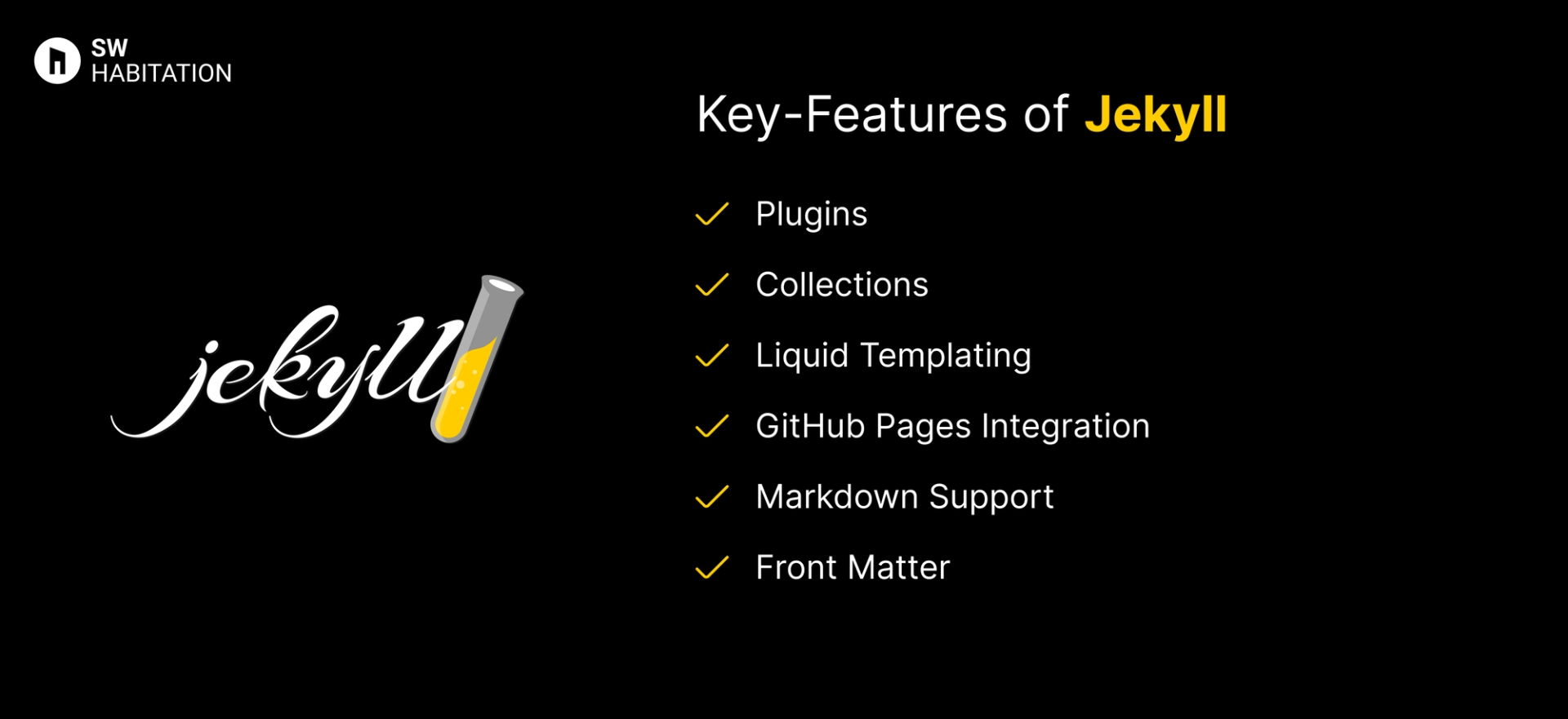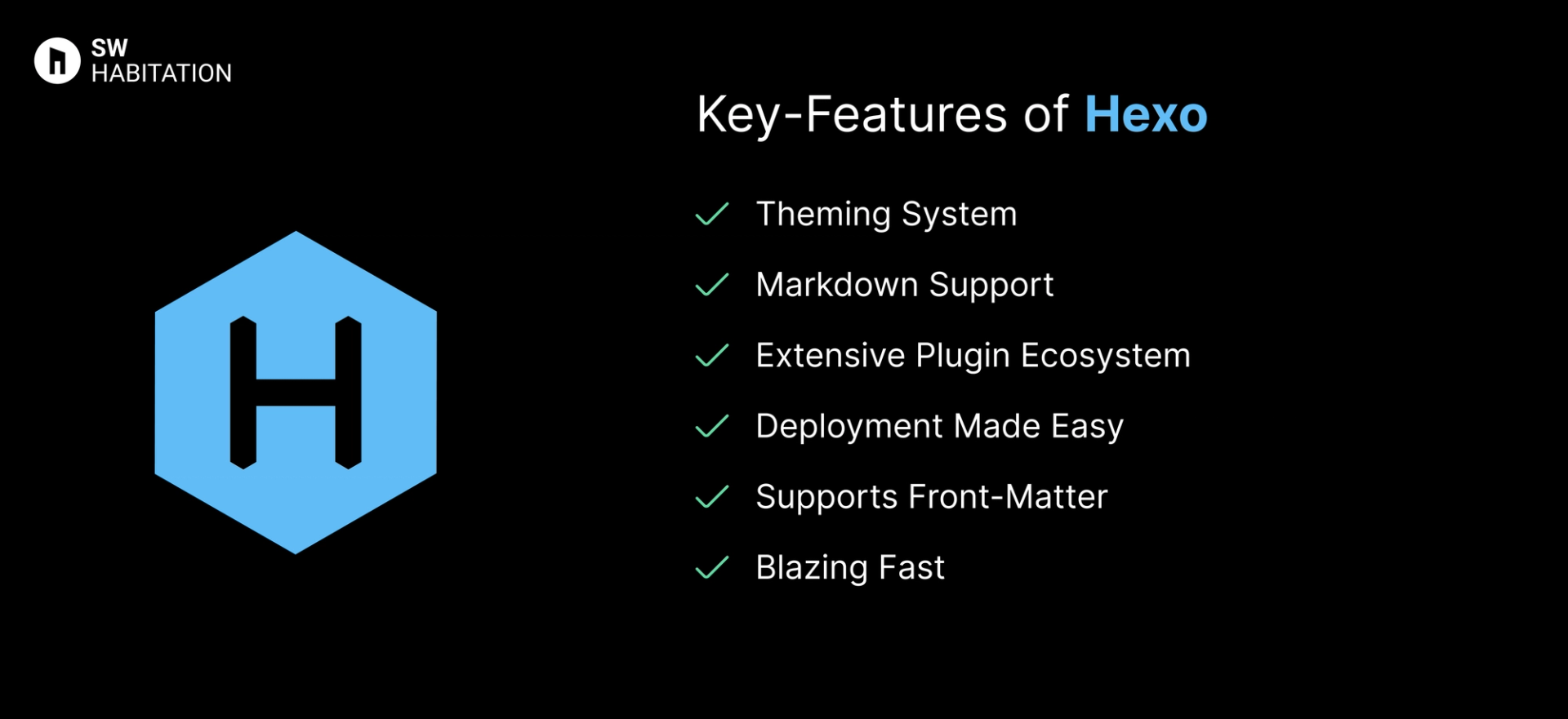Jekyll vs. Hexo

Jekyll

Hexo
Have you ever been to a website that loads super fast? Chances are it uses an SSG (Static Site Generator). It’s a tool that builds your site ahead of time, so when someone visits, they get the page instantly. No waiting around for things to load it’s just there.
What is Jekyll?
Jekyll is an open-source static site generator built with Ruby. It takes your text files (written in Markdown), processes them through templates, and generates a static website that you can deploy anywhere.
No databases, no server-side scripting it just pure HTML, CSS, and JavaScript. It’s super popular among developers, especially for creating personal blogs and documentation sites.
Key Features of Jekyll


- Plugins: Extend functionality with a rich plugin ecosystem.
- Collections: Organize content beyond just posts and pages.
- Liquid Templating: Use Liquid, a simple templating language, to customize your site.
- GitHub Pages Integration: Seamless deployment on GitHub Pages.
- Markdown Support: Write content in Markdown, and Jekyll handles the rest.
- Front Matter: Easily add metadata like titles, tags, and layout options.
Advantages of Jekyll
- Highly Customizable: Tweak layouts, templates, and styles to make the site your own.
- Active Community: Tons of tutorials, plugins, and themes to explore.
- Simplicity: No database, no backend — just Markdown and templates.
- GitHub Pages Friendly: Direct integration with GitHub Pages means free hosting and automatic deployment.
- Perfect for Blogs: Designed with blogging in mind, making it easy to manage posts.
Disadvantages of Jekyll
- Build Times: For very large websites, build times can get a bit slow compared to newer tools.
- Limited Dynamic Content: Since it’s static, things like user authentication or live updates need extra work.
- Requires Ruby: You’ll need Ruby installed on your system, which can be a hurdle for some.
What is Hexo?
Hexo is a Node.js powered static site generator that transforms Markdown files into static HTML pages. It’s particularly popular among bloggers and developers who love the simplicity of Markdown but also want a bit more control over the final website output as well.
Key Features of Hexo


- Theming System: Supports customizable themes for a personalized look.
- Markdown Support: Write your content in Markdown and let Hexo handle the rest.
- Extensive Plugin Ecosystem: Offers a range of plugins for SEO, analytics, and more.
- Deployment Made Easy: One-command deployment to platforms like GitHub Pages or Vercel.
- Supports Front-Matter: Add metadata like titles, tags, and categories to each post.
- Blazing Fast: Generates static files in seconds, even for large websites.
Advantages of Hexo
- Huge Plugin Library: Extend functionality effortlessly.
- Perfect for Blogs: Tailored to bloggers who want to focus on content.
- Minimal Setup: Simple installation and configuration.
- Speed: Lightning-fast build times.
- Markdown Focused: Keeps writing pure and distraction-free.
Disadvantages of Hexo
- Less Modern Than Some Alternatives: Lacks the modern features of frameworks like Next.js or Gatsby.
- Limited Dynamic Content: Not ideal for highly interactive sites.
- Node.js Required: Needs Node.js installed.
Comparison Between Jekyll vs Hexo
Use Cases of Jekyll
- Portfolios: Showcase your work with a simple, fast, and customizable site.
- GitHub Projects: The perfect companion for project documentation hosted on GitHub.
- Documentation Sites: Clean, simple, and easy to organize docs.
- Personal Blogs: Its blogging-focused features make it a favorite for tech blogs.
Use Cases of Hexo
- Fast Deployments: Get your site online with a single command.
- Technical Documentation: Write clean, organized docs quickly.
- Blogging: Built with bloggers in mind, especially those who love Markdown.
- Developer Portfolios: Show off projects with minimal effort.
Other Resources
Conclusion
Static Site Generators are a big game changer if you’re looking to build a website that’s fast, secure, and easy to maintain. Whether you’re launching a personal blog, portfolio, or a business website, they give you the freedom to focus on what really matters, your content and your users without all the extra complexity.
The best part? You’re not locked into one way of doing things. You can choose the tools and tech you’re most comfortable with, and scale things up as your site grows. From lightning-fast load times to better SEO and easy hosting, SSGs make the whole process smoother.
At the end of the day, it comes down to what fits your workflow and goals best. Pick the one that feels right to your requirements, and you’ll be well on your way to creating a beautiful, high-performing website that you’re proud of 🙌
Frequently asked questions
Is Jekyll easy to set up?
Yes, Jekyll is developer-friendly and has great documentation. However, it does require Ruby and some command-line usage to set up and deploy.
Can I host Jekyll on GitHub Pages?
Yes, Jekyll integrates seamlessly with GitHub Pages, allowing you to host your site for free directly from your GitHub repository.
Does Jekyll require a database?
No, Jekyll is file-based, meaning your content is stored as Markdown or HTML files. It compiles everything into static files, so there’s no need for a database.
What is Jekyll good for?
Jekyll is perfect for building blogs, documentation sites, portfolios, and personal websites. It’s highly optimized for Markdown and Liquid templating.
What’s Hexo good for?
Hexo is good for building fast blogs and simple static websites that need to be quickly set up and easily managed.
Is Hexo easy to set up?
Yup, Hexo has a straightforward setup process and is easy to get running with minimal configuration.
Does Hexo use Markdown?
Yup, Hexo uses Markdown files to create content, so it's developer-friendly and easy for content creators to manage.
Does Hexo support plugins?
Yup, Hexo has lots of plugins available to extend its functionality, whether it’s for SEO, performance, or content management.
